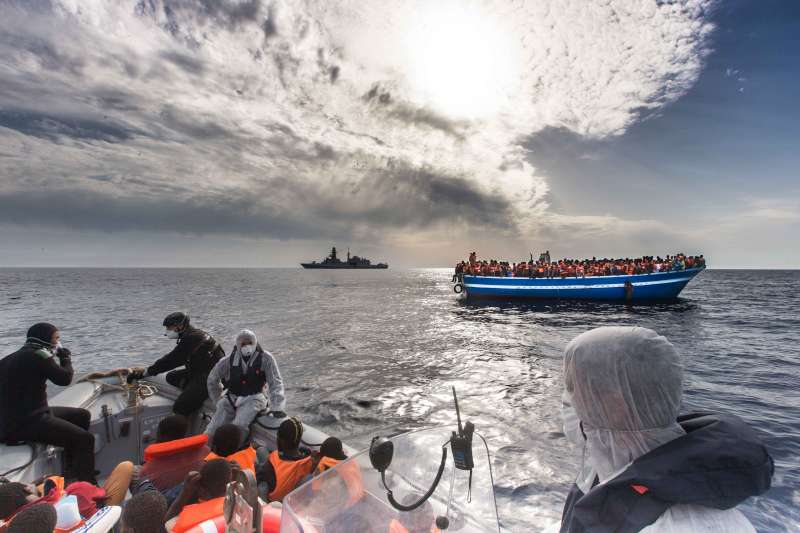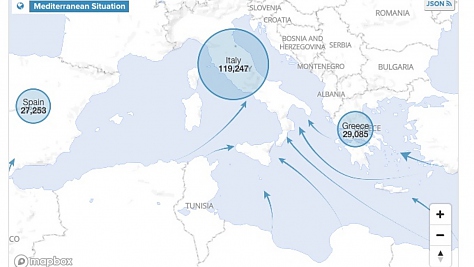At UNHCR, we press for concerted European action to prevent the loss of lives at sea. We also work to ensure access to asylum, dignified reception conditions and durable solutions for refugees – with particular attention to people with acute needs and vulnerabilities.
The scale and fluidity of refugee movements in Europe have posed significant challenges for asylum systems and reception facilities in many countries. Faced with domestic pressure, numerous countries have responded by unilaterally imposing tighter legal and physical restrictions on access to their territory.
UNHCR advocates for fair and effective asylum systems across Europe to ensure that asylum-seekers are able to access asylum and effective protection. We also advocate with governments to enhance opportunities and support for local integration of refugees. In the absence of fully functioning asylum systems in some European countries, UNHCR assists States in establishing fair and efficient asylum procedures.
Among the millions of stateless people worldwide, UNHCR estimates that around 570,000 live in Europe. We are assisting European countries to identify and protect those who are stateless, as well as to prevent and reduce statelessness on the continent.
UNHCR’s Regional Bureau for Europe covers 49 countries. We work with a range of organizations and partners, including the European Union and its agencies, the Council of Europe, the Organization for Security and Cooperation in Europe, other UN agencies, civil society and NGOs. The Bureau also engages with supranational legal institutions, including the European Court of Human Rights and the Court of Justice of the European Union.
Children on the move and unaccompanied and separated children
In 2016, close to 100,300 refugee and migrant children arrived in Bulgaria, Greece, Italy, and Spain – and one in three was unaccompanied or separated from their family. Children on the move and unaccompanied and separated children face many protection risks in Europe, including detention, sexual and gender-based violence, further family separation, psychological distress and security risks. These dangers are exacerbated when they are placed in inadequate reception facilities and cannot access appropriate care. Lack of educational opportunities or recreational activities also impact their well-being.
Learn more:
- The Way Forward to Strengthened Policies and Practices for Unaccompanied and Separated Children in Europe
- Call to Action for 2017
- Refugee and Migrant Children in Europe – Accompanied, Unaccompanied and Separated
UNHCR’s response to the refugee and migrant situation in Europe
In 2015, and the first months of 2016, almost 1.2 million refugees and migrants reached European shores, most fleeing conflict and persecution. Many lost their lives or saw loved ones perish at sea in their attempt to reach safety. An increasing number of families, women and unaccompanied children undertook perilous journeys across several countries and often faced exploitation at the hands of smugglers.
Learn more: Regional Refugee and Migrant Response Plan for Europe (January-December 2017)
UNHCR in Ukraine
As a result of the ongoing conflict in Ukraine, over 1.6 million people were registered as internally displaced by the end of December 2016. Another 470,000 Ukrainians were seeking asylum in neighbouring countries at year end, 94 per cent of them in the Russian Federation. Under a UN coordinated response, UNHCR leads and coordinates the humanitarian response with regard to protection, emergency shelter and non-food assistance for people displaced inside Ukraine.
Learn more about our work in Ukraine
UNHCR data and resources on Europe
- UNHCR operations in Europe
- Guide to UNHCR's resources
- Desperate Journeys: Refugees and migrants entering and crossing Europe via the Mediterranean and Western Balkan routes – January to June 2017
- Factsheet: Better Protecting Refugees in the EU and Globally (December 2016)
In photos: Refugees in Europe
05 October 2017
-
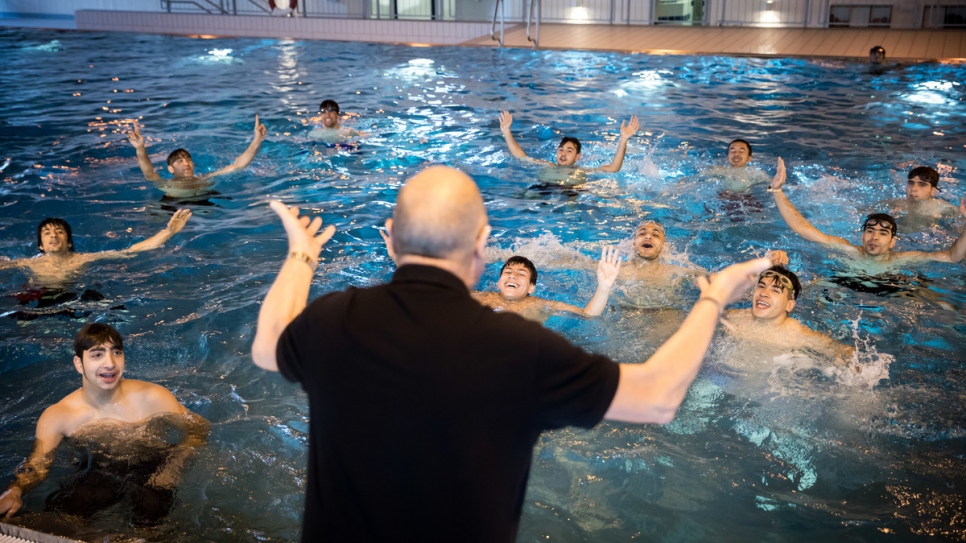 Local volunteer Heino Rahmstorf leads a swimming session for asylum-seekers from Syria, Iraq and Afghanistan at the swimming pool in Neu Wulmstorf, Germany. © UNHCR/Gordon Welters
Local volunteer Heino Rahmstorf leads a swimming session for asylum-seekers from Syria, Iraq and Afghanistan at the swimming pool in Neu Wulmstorf, Germany. © UNHCR/Gordon Welters -
 Syrian refugee chef Nabil Attar and French chef Walid Sahed show their joint creation at Les Pantins restaurant in Paris on June 16, 2017. © UNHCR/Benjamin Loyseau
Syrian refugee chef Nabil Attar and French chef Walid Sahed show their joint creation at Les Pantins restaurant in Paris on June 16, 2017. © UNHCR/Benjamin Loyseau -
 Sulaf, a Palestinian refugee displaced from Damascus, Syria, tests a bicycle for size with the help of Jim Stein, the founder of The Bike Project in London. The volunteer initiative refurbishes second-hand bikes for refugees and asylum-seekers. © UNHCR/David Azia
Sulaf, a Palestinian refugee displaced from Damascus, Syria, tests a bicycle for size with the help of Jim Stein, the founder of The Bike Project in London. The volunteer initiative refurbishes second-hand bikes for refugees and asylum-seekers. © UNHCR/David Azia -
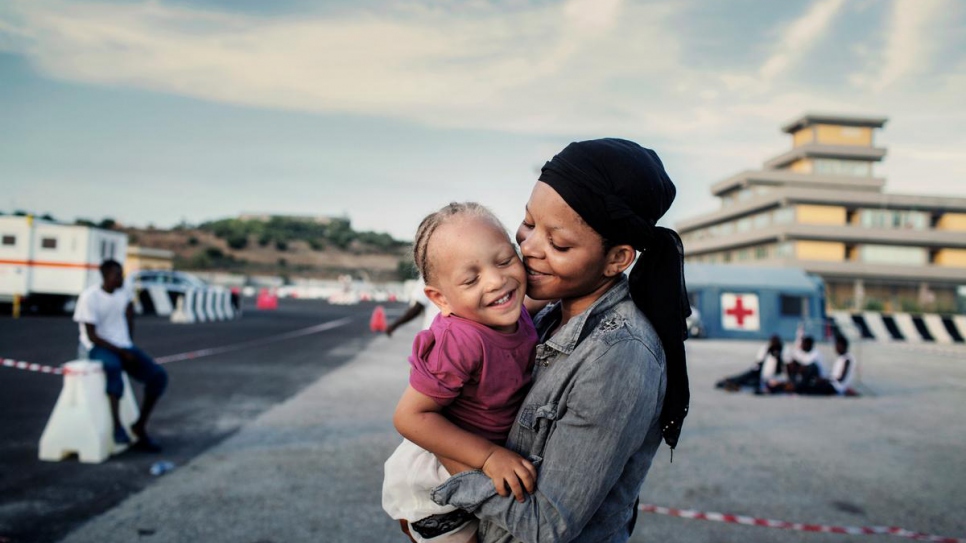 Nigerian refugee Shalom, 24, hugs her young daughter after being rescued at sea and taken to the Italian port of Augusta. © UNHCR/Alessandro Penso
Nigerian refugee Shalom, 24, hugs her young daughter after being rescued at sea and taken to the Italian port of Augusta. © UNHCR/Alessandro Penso -
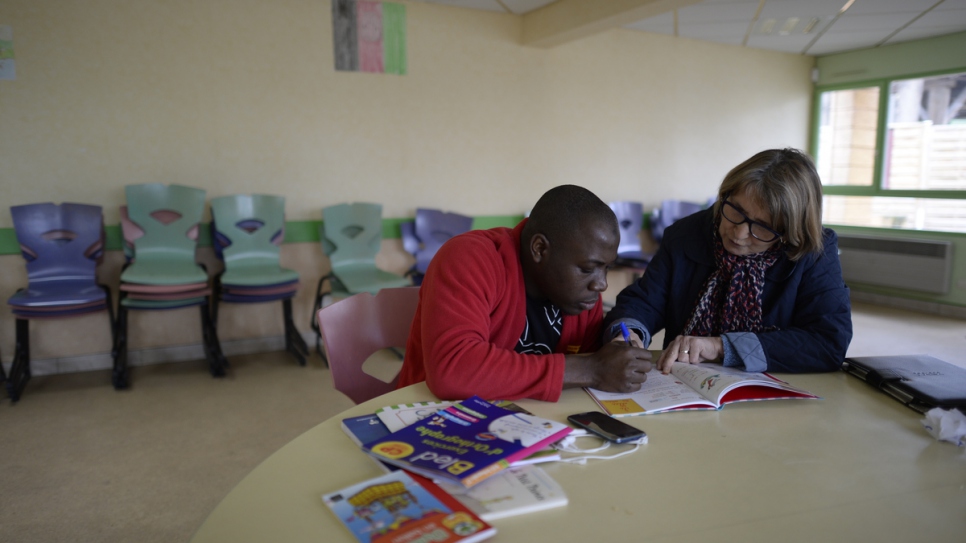 "When you see their desire to learn, it gives you a boost of energy," says Brigitte Dubosclard, a volunteer French teacher for refugees in Pessat-Villeneuve, France. The small town in central France converted its château into a reception centre that has welcomed 136 refugees. © UNHCR/Benjamin Loyseau
"When you see their desire to learn, it gives you a boost of energy," says Brigitte Dubosclard, a volunteer French teacher for refugees in Pessat-Villeneuve, France. The small town in central France converted its château into a reception centre that has welcomed 136 refugees. © UNHCR/Benjamin Loyseau -
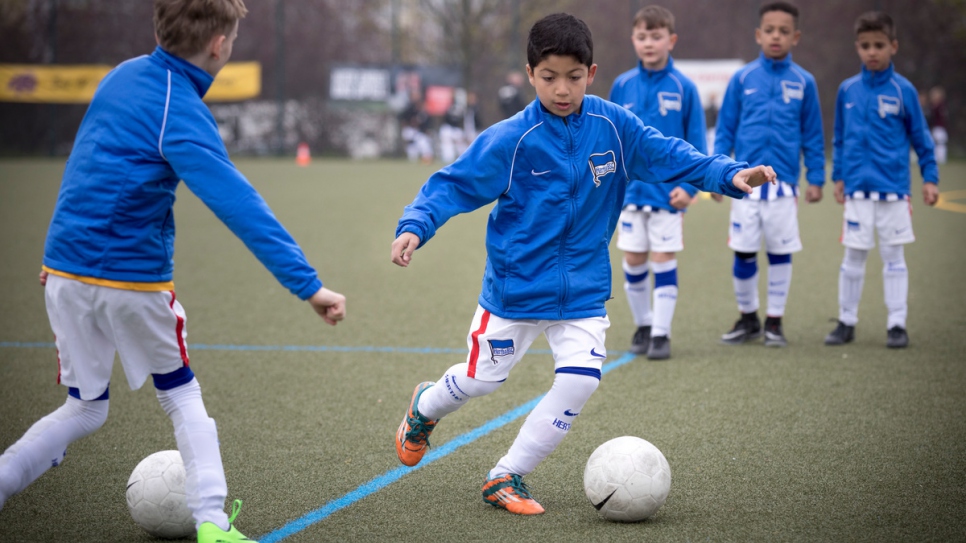 "I couldn't play football in Syria, but here I can play whenever I want." Eight-year-old Syrian refugee Ahmad Alzaher takes part in a trial for Bundesliga club Hertha in Berlin, Germany. © UNHCR/Christian Mang
"I couldn't play football in Syria, but here I can play whenever I want." Eight-year-old Syrian refugee Ahmad Alzaher takes part in a trial for Bundesliga club Hertha in Berlin, Germany. © UNHCR/Christian Mang -
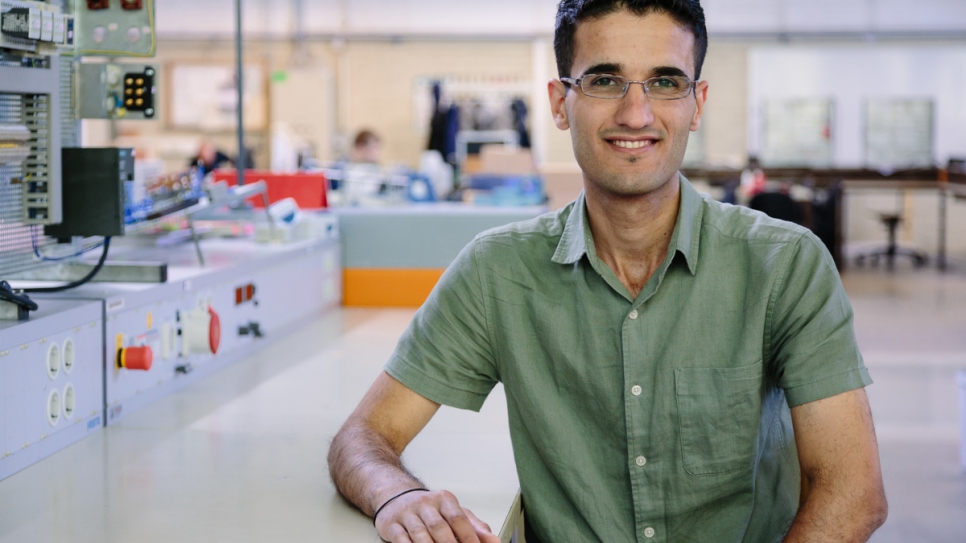 "It's an amazing chance to learn about this newer technology," says Syrian refugee, Mahmoud Nouri Al Abdulah, 26, as he prepares to begin a three-year training programme with Germany's largest railway operator, Deutsche Bahn. © UNHCR/Aubrey Wade
"It's an amazing chance to learn about this newer technology," says Syrian refugee, Mahmoud Nouri Al Abdulah, 26, as he prepares to begin a three-year training programme with Germany's largest railway operator, Deutsche Bahn. © UNHCR/Aubrey Wade -
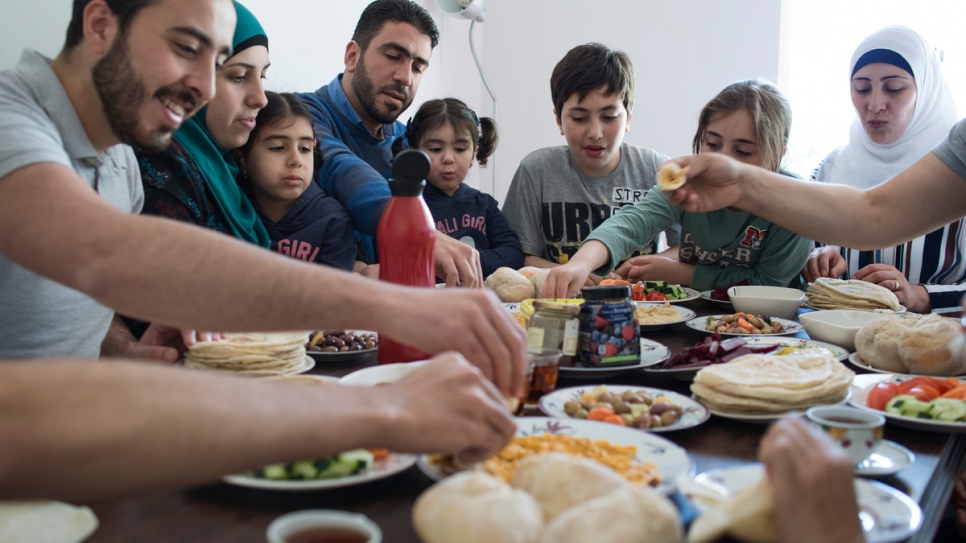 The Dabah family, who fled war in Syria in 2012, eat breakfast at their home in Lisbon, Portugal. © UNHCR/Bruno Galán Ruiz
The Dabah family, who fled war in Syria in 2012, eat breakfast at their home in Lisbon, Portugal. © UNHCR/Bruno Galán Ruiz -
 Mona and Kaj are Finnish pensioners who have assumed the role of grandparents for 3-year-old Diana, a refugee from Iraq who arrived on the Finnish island of Nagu in 2015. Diana and her father, Azaldeen, fled Iraq after her mother was abducted. © UNHCR/Max-Michel Kolijn
Mona and Kaj are Finnish pensioners who have assumed the role of grandparents for 3-year-old Diana, a refugee from Iraq who arrived on the Finnish island of Nagu in 2015. Diana and her father, Azaldeen, fled Iraq after her mother was abducted. © UNHCR/Max-Michel Kolijn -
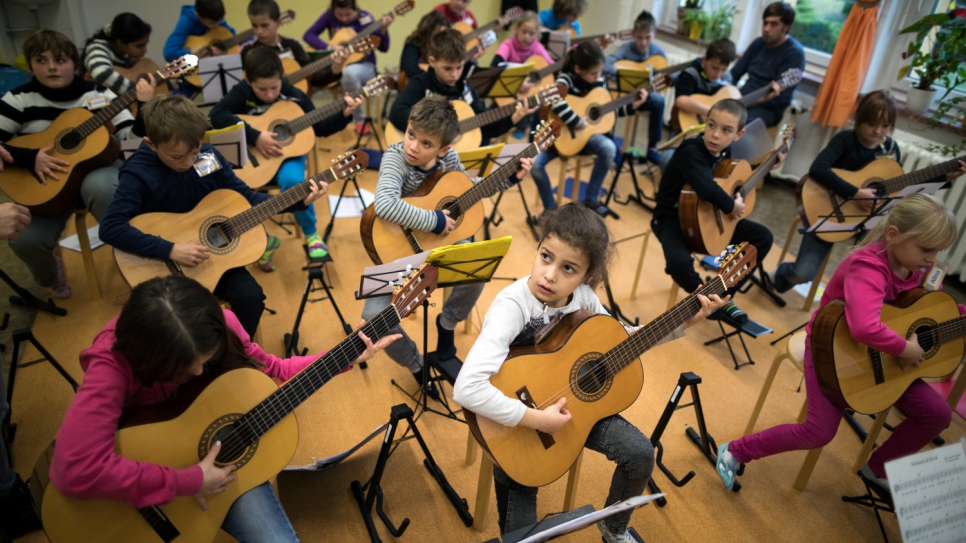 Over the course of eight years, the population of Golzow, Germany, shrank by 12 per cent, to just 835 people. Now Syrian refugees like Kamala are helping to reverse the decline. © UNHCR/Gordon Welters
Over the course of eight years, the population of Golzow, Germany, shrank by 12 per cent, to just 835 people. Now Syrian refugees like Kamala are helping to reverse the decline. © UNHCR/Gordon Welters -
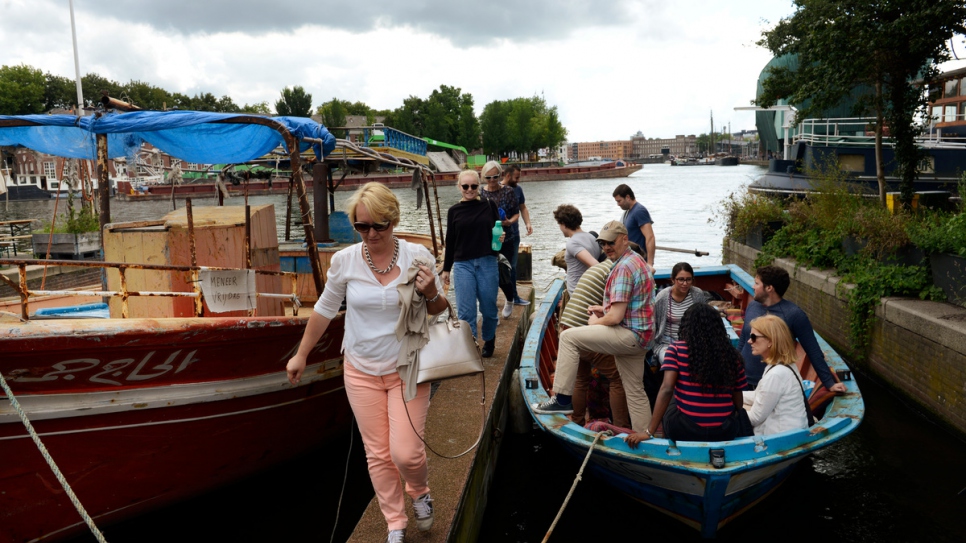 Boats used by refugees to reach safety in Europe are now being repurposed as tour boats on the canals of Amsterdam, with refugees serving as guides. The "Mister Friday" (left) once carried 282 refugees and migrants across the Mediterranean, while "Hedir" (right), meaning "Stormy Weather," carried 76. © UNHCR/Chris de Bode
Boats used by refugees to reach safety in Europe are now being repurposed as tour boats on the canals of Amsterdam, with refugees serving as guides. The "Mister Friday" (left) once carried 282 refugees and migrants across the Mediterranean, while "Hedir" (right), meaning "Stormy Weather," carried 76. © UNHCR/Chris de Bode -
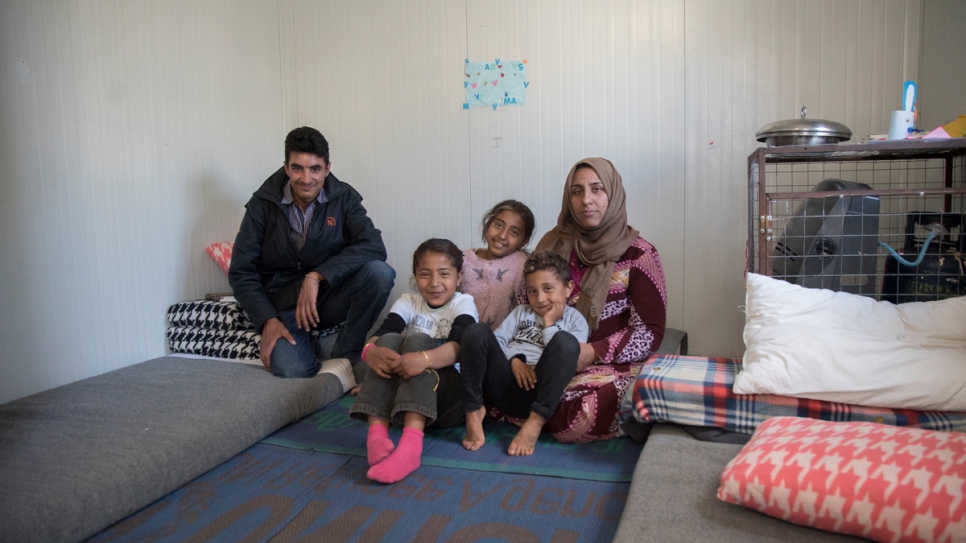 A Syrian family inside their prefabricated container installed by UNHCR at Kara Tepe, in Lesvos, Greece. Over 5,000 refugees and migrants have found shelter in 1,000 prefabricated houses installed by UNHCR across Greece. © UNHCR/Pavlos Avagianos
A Syrian family inside their prefabricated container installed by UNHCR at Kara Tepe, in Lesvos, Greece. Over 5,000 refugees and migrants have found shelter in 1,000 prefabricated houses installed by UNHCR across Greece. © UNHCR/Pavlos Avagianos -
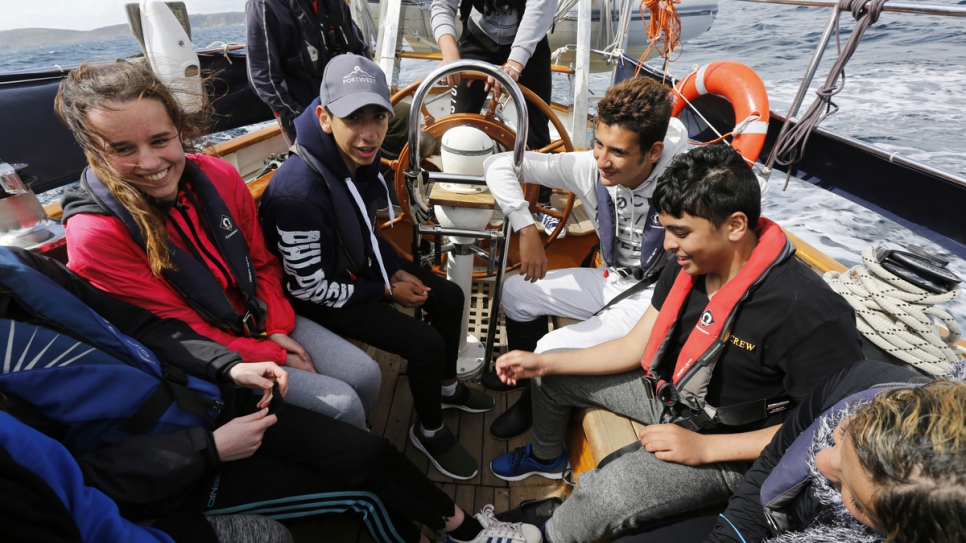 Teenagers from Syria and Ireland learn to sail together off the coast of West Cork, Ireland. The teens, who all live in Ballaghaderreen in County Roscommon, are learning sailing skills as well as teamwork. © UNHCR/Phil Behan
Teenagers from Syria and Ireland learn to sail together off the coast of West Cork, Ireland. The teens, who all live in Ballaghaderreen in County Roscommon, are learning sailing skills as well as teamwork. © UNHCR/Phil Behan -
 In Damascus, Yousef, 23, used to make curtains with his father. Now refugees in Kiel, Germany, they put their skills to good use at a sail-making company named Coastworxx. © UNHCR/Gerhard Westrich
In Damascus, Yousef, 23, used to make curtains with his father. Now refugees in Kiel, Germany, they put their skills to good use at a sail-making company named Coastworxx. © UNHCR/Gerhard Westrich

